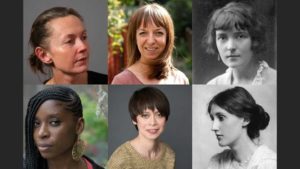In October 2020 we posted the last of our regular pieces for Something Rhymed, close to seven years since we began our blog about female literary friendship. Although it was a difficult decision for us to stop, the demands of new writing projects that we were pursuing individually, not to mention many changes in our personal circumstances, meant that we both agreed that this particular chapter in our creative lives had to come to a close.
Since that last post, Emma has been hard at work on her novel-in-progress, and I’ve been privileged to read several draft sections already. I have been enjoying watching the story and historical world she’s creating taking shape, and I very much look forward to the day when I’ll be able to hold the published version in my hands.
In my case, following on from A Secret Sisterhood – the book the two of us published in 2017, which focuses on the literary friendships of Jane Austen, Charlotte Brontё, George Eliot and Virginia Woolf – I have spent the last months getting ready for the publication of another nonfiction book, which has now been released in Canada, the UK and the USA.
Out of the Shadows: Six Visionary Victorian Women in Search of a Public Voice, a group biography, draws on diaries, letters, rarely seen memoirs and texts to tell the stories of six enterprising women of the nineteenth century, whose apparent ability to contact the dead brought them fame, fortune and astonishing levels of social and political influence.
Although I wrote this book on my own this time, as I mention in its Acknowledgements section, Emma was with me through every step of the creative process. She was the first person who I told about my idea to write about the lives of female celebrity Spiritualists, and it was conversations with her that helped me to choose which women’s lives would be my focus.
In the end, I decided to write about six women who – as the book’s subtitle suggests – all used their Spiritualism as a way to make themselves heard on the public stage. The Fox sisters, from upstate New York, inspired some of the era’s best-known political activists and set off a transatlantic séance craze. London-born Emma Hardinge Britten, a renowned female orator, delivered controversial speeches to packed concert halls while apparently in the throes of a trance. Former childhood clairvoyant Victoria Woodhull, a Wall Street trailblazer, became America’s first female presidential candidate; Georgina Weldon, whose beliefs nearly saw her confined to an asylum, went on to establish herself as a successful campaigner against Britain’s archaic lunacy laws.
As I continued my research, using library and museum archives on either side of the Atlantic and visiting key locations associated with these women’s lives, I frequently discussed my developing ideas with Emma. Once I’d managed to get my chapters into a reasonable shape, Emma was there again with her usual forensic literary eye to offer critical feedback and encouragement. And, as ever, I have been so grateful for her insights during the later stages of the book’s production – when I was considering potential book cover designs and coming up with ideas for related publicity, for instance.
One of my fondest memories, however, is of sending Emma my final chapters for review in – though we didn’t know it yet – the last months before the UK would be plunged into a series of pandemic-related lockdowns, meaning that we would be largely unable to meet in person for a year-and-a-half. Having read my work, Emma invited me over to her house so that we could talk about her thoughts. Huddled together in her beautiful book-lined sitting room, working our way through these last pages I had written, I was reminded how fortunate it was that our paths had collided when we were young women – and that we have been walking the same route, as writer-friends, for almost two decades since.
Out of the Shadows has been reviewed in, among others, the Wall Street Journal, which praised its ‘tapestry of complex characters with conflicted motivations, woven together with the color of ghostly apparitions (and angry mobs); the New York Times, which said, ‘Midorikawa’s chosen Spiritualists are a colorful bunch, and her lively writing makes their careers fun to follow’; and Publishers Weekly, which said, ‘Women’s history buffs will be enthralled.’ It is available as a print, e or audio book.
A final note: the two of us will be taking part in the Royal Society of Literature’s Dalloway Day celebrations, in an online event in association with the British Library at 7.30pm (UK time) on Wednesday 16 June. We’ll be discussing the literary friendship of Katherine Mansfield and Virginia Woolf with Kirsty Gunn and Irenosen Okojie, and it would be wonderful if you could join us for this if you can. Tickets are available if you follow this link and scroll down to our event.



Quick note and then I am off to look up your book. It sounds marvellous and absolutely up my street! I’ve long wanted to write something about a fictional 19th century female spiritualist and maybe this will be the thing to light a fire under me.
So nice to hear from you, Sara! Thanks for getting in touch. I hope you find Out of the Shadows interesting.
Lovely piece about a lovely friendship. Congratulations Emily on your new book!
Thank so much, Kathleen! Always nice to hear from you.
You and Emma are great current examples of that sisterhood of female writers and it’s heart-warming to read about it. I’ve got my copy of the book now!
Thank you so much for those lovely words, Andrea. I do hope you enjoy Out of the Shadows.
Got my copy too…